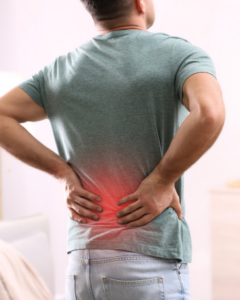
Back pain and injuries are common, but knowing when one is serious is crucial for proper treatment and recovery. While minor injuries may improve with rest, some signs indicate a more severe issue that requires medical attention. At Orthopedic Sports and Medicine Center, we help you understand when a back injury needs professional care to prevent long-term damage.
Severe or Persistent Pain
Sudden, intense back pain after an injury may indicate something serious, such as a fracture, herniated disc, or nerve damage. If the pain doesn’t improve with rest or over-the-counter medication, it’s essential to see a specialist. Sharp or radiating pain down your legs can signal nerve involvement, which requires medical evaluation to prevent further complications.
Numbness, Tingling, or Weakness
Experiencing numbness, tingling, or weakness in your legs, feet, or buttocks after a back injury may indicate nerve compression, such as from a herniated disc, degenerative disc disease, or spinal stenosis. These symptoms can become permanent if untreated, so you must seek care if you notice these signs.
Loss of Bowel or Bladder Control
A loss of control over bladder or bowel function following a back injury is a medical emergency. This symptom is associated with cauda equina syndrome, a serious condition caused by nerve compression in the lower spine. Immediate treatment is needed to prevent permanent damage.
Pain That Radiates Down Your Legs
Sciatica, pain radiating from the lower back down the legs, is often caused by nerve compression from conditions like herniated discs. While sciatica may improve with conservative treatments, persistent or worsening pain should be evaluated by a specialist to prevent long-term nerve damage.
Difficulty Standing or Walking
If your back injury affects your ability to stand, walk, or maintain balance, it may indicate a structural issue like a fracture or spinal cord injury. Difficulty with basic movements should not be ignored, as this could signal a serious problem requiring medical intervention.
Trauma-Related Back Pain
Back pain following trauma, such as a fall or car accident, should always be taken seriously, even if it seems mild initially. Traumatic injuries can cause fractures or internal damage that may worsen over time. Seeking medical attention promptly can prevent complications.
Risk Factors for Severe Injuries
Certain factors increase your risk of severe back injuries. Older adults, individuals with osteoporosis, and those who have had prior back injuries are more susceptible to fractures and degenerative conditions. Additionally, athletes or those involved in heavy lifting are at greater risk of severe back problems.
Back Pain Specialist in Elkhart, IN, Goshen, IN, Granger, IN, Middlebury, IN, and Nappanee, IN
Serious back injuries often present with severe pain, numbness, weakness, or difficulty with movement. Loss of bowel or bladder control is a medical emergency and trauma-related back injuries should always be evaluated. If you experience these symptoms, seeking care to prevent long-term damage is crucial.
At Orthopedic Sports and Medicine Center, our specialists help diagnose and treat serious back injuries. If you’re experiencing persistent pain or other concerns, you can book an appointment online.

